
All the memes in Patricia Lockwood’s No One Is Talking About This, explained.
Patricia Lockwood’s No One Is Talking About This gets the ephemerality of online right: images and interactions flash onscreen, seeming very important, and then, for the time being, they slip away. But not all readers are as digitally literate as the narrator; some of you might enjoy a little context, so I’ve compiled all the memes in the book with explanations.
My use of “all” here is subjective, as the lines between meme and mere Thing Documented On The Internet are blurred. I’ve included all the Internet references where I think context might be fulfilling; I haven’t listed events where all the backstory is included, like fairgoers dying on a carnival ride at the Ohio State Fair, and general widespread phenomena, like people finding young Stalin handsome or bad art about social media addiction or mothers mistakenly using sexual emojis. No explanation needed there.
Using that criteria, below is a full accounting of all the memes referenced in No One Is Talking About This, explained. Enjoy.
1. “a chihuahua perched on a man’s erection” (pg. 1)
This Tinder screenshot was originally shared on Reddit.

2. “a garage door spray-painted with the words STOP! DON’T EMAIL MY WIFE!” (pg. 1)
In 2013, an unidentified Illinois man spray-painted the message “STOP NOW” and the related message “don’t email my wife!!!!” onto another guy’s garage. One can infer the content of the emails from this. (Horny.) “Stop! Don’t email my wife!” guy was one of the earliest online guys recognized as a “wife guy,” which is a type of guy made clownish by his relationship to a wife.
(Other wife guys include I Love My Curvy Wife guy, Elf Wife guy, I Posed As My Wife guy, and Cliff Wife guy.)
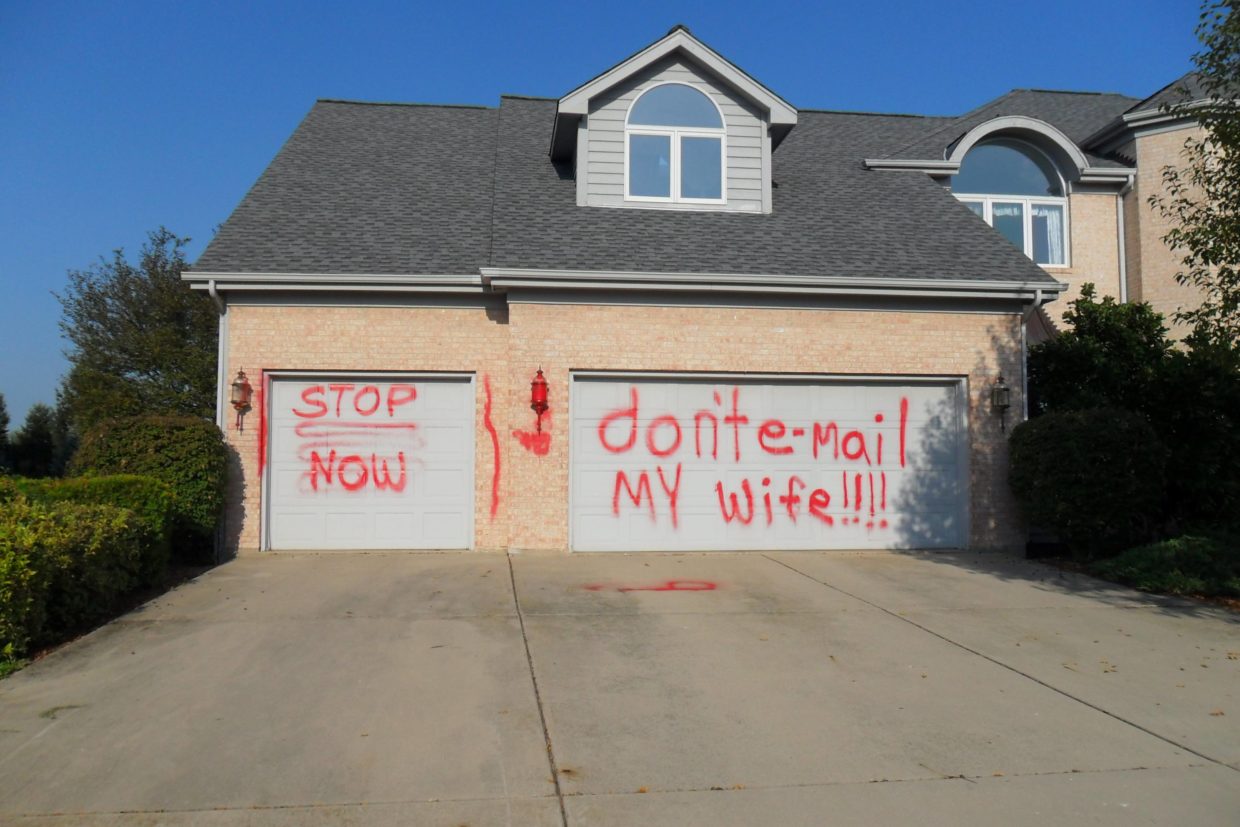
3. “she carefully washed her legs under the fine needles of water, for she had recently learned that some people didn’t” (pg. 5)
In 2019, DSA member Conor Arpwel tweeted a poll asking, “Do you wash your legs when you take a shower?” (The tweet is no longer available.) The poll received over eight hundred thousand responses; 87% of respondents said yes, but the “no”s became vocal, saying that water flows down your body in the shower so there’s no need to actively wash your legs.
https://twitter.com/sophcw/status/1126647888635785216
Hello! I am a Dermatologist and author of #beyondsoapbook. It discusses the harmful effects of soap on the skin and how over cleanliness has lead to diseases like eczema, asthma and allergies. You don’t lather up if you are not dirty. So no leg washing unless they are dirty.
— Dr.SandySkotnicki (@DrSkotnicki) May 11, 2019
Others disagreed.
I'm not gonna speak on the proper interval for bathing one's self. That can be variable on a personal level. But once you're IN the shower… why would u skip your legs??? If you wash your car, and skip the doors… did you really wash it?!
— Ty. (@MFN_Ty) May 10, 2019
Damn imagine you found the love of your life…then you see her tweeting about not washing her legs
— Timberwolves Brooklyn ? (@RobbyRav) May 10, 2019
The wheels were already greased for discussion of personal washing habits; this all went down shortly after Twitter staple and lesbian sunglasses truther Yashar Ali’s controversial February 2019 claim that any given couple should own a minimum of “10 Bath Sheets; 10 Bath Towels; 10 Hand Towels; 10 Wash Cloths; preferably more.”
4. “the theme song of a childhood show where mannequins come to life in a department store” (pg. 6)
The theme to the Canadian children’s show Today’s Special:
5. “the compliments that rural sheriffs paid to porn stars” (pg. 7)
Possibly a distortion of this event: In 2015, Clyde Police Chief Bruce Gower revealed to the public that Sandusky County Sheriff Kyle Overmyer’s Twitter page, @YoungSheriff, followed at least five porn stars. Gower claimed a local minister had alerted him to this fact. (Note: in 2016, Gower challenged Overmyer in the Republican primary and lost.) Concerns were raised about children innocently mousing their way to the sheriff’s page out of political interest and being exposed to explicit content. Said Overmyer, “[Sometimes I click Twitter’s follow button] to be nice. You know, somebody follows you so you follow them in return.” The account was taken down; Overmyer said he “didn’t need it anymore.”
This event bears resemblance to a more well-known 2017 incident where Senator Ted Cruz’s account liked a hardcore porn video tweeted from an account called “Sexuall Posts.”
6. “the thread of women all realizing they had the exact same scar on their knee” (pg. 7)
In June 2017, Logan Browning, star of Dear White People, attended the BET Awards. The next day, Twitter user @jadoreadjones (now deactivated) tweeted a photo of Browning at the BET Awards with a visible scar on her knee, captioned, “RT this if you’re a black girl with this scar on your knee . . . trying to see something.” The tweet went viral, as other Black women started sharing pictures of their scars in the same place. Another tweet on the same topic went viral in 2020.
7. “a girl applying her foundation with a hard-boiled egg” (pg. 7)
In early 2017, makeup bloggers made videos using hard-boiled eggs as beautyblenders. This trend appears to start with makeup artist Esther Gbudje, who told the Daily Mail she came up with the idea after noticing her egg had a similar shape to a beautyblender and thinking, “I might as well.”
8. “a shiba inu in Japan leaping from paw to paw to greet its owner” (pg. 7)
9. “someone who made a heinous substitution in guacamole” (pg. 9)
Presumably the New York Times, who advocated adding peas to guacamole and told the public to “trust [them]”:
Add green peas to your guacamole. Trust us. http://t.co/7imMY9c2ph pic.twitter.com/oeOMt2qgmh
— The New York Times (@nytimes) July 1, 2015
Twitter users did not react positively, calling the tweet heresy, the worst food advice ever, and a frightening endorsement of “Gentrificamole.” Then President Obama weighed in:
respect the nyt, but not buying peas in guac. onions, garlic, hot peppers. classic. https://t.co/MEEI8QHH1V
— President Obama (@POTUS44) July 1, 2015
Strangely, a year later, the man behind the tweet revealed himself, to minimal fanfare.
https://twitter.com/migold/status/748936975378292737
10. “there was a new toy” (pg. 11)
Fidget spinners.
11. “it became important . . . whether you had that one Tupperware stained completely orange” (pg. 12)
This was a topic of conversation on Twitter in 2017.
12. “grisly british witch pits” (pg. 18)
A canned phrase from a 2014 headline: ”Grisly British witch pits were used in rituals until 1970s, archaeologists discover.” That’s a pretty clear-cut description of the article’s contents; essentially, archaeologists found shallow holes lined with animal skins and filled with bones and other ritual items in west Cornwall. This phrase was never taken out of context on a large scale, but its assonance makes it sticky.
13. “sex in the moon next summer” (pg. 18)
In 2012, many X-rated Twitter spambots appeared, all sporting the bio, “Sex in the moon next summer.” People found this funny and started using the phrase—including Lockwood herself.
14. “what is ‘binch’ what is ‘to be corncobbed’” (pg. 18)
There are two layers to this one.
First layer: “Binch” is a fun misspelling of “bitch.” “To be corncobbed” is to be owned—to be humiliated, show one’s ass—and refuse to admit it, an expression stemming from this 2011 @dril tweet:
"im not owned! im not owned!!", i continue to insist as i slowly shrink and transform into a corn cob
— wint (@dril) November 11, 2011
Second layer: the quote “What is ‘binch’? What is to be ‘corn cobbed’?” refers to a 2017 tweet by journalist John Stoehr. The tweet is thought to be a response to a Twitter exchange Stoehr witnessed the day before: a Twitter user with the handle @_Chilladelphia responded to a post that centrist poster Candace Aiston made about healthcare with an image of Aiston with her eyebrows replaced by corncobs. (Implying Aiston had embarrassed herself by posting a bad take.) Aiston quote tweeted that tweet with the inflammatory caption, “This is what Bernie Bros do to women who present them with facts.” User @ironghazi screenshotted the exchange and added big red text that said “CORNCOBBED ONLINE,” and tweeted at Aiston, “You got cobbed.” (These tweets have since been deleted.)
The next day, presumably having witnessed this exchange, Stoehr tweeted the quote in question, “What is ‘binch’? What is to be ‘corn cobbed’?” The tone of tweet is not only confused but moralizing; for that day Stoehr also tweeted, seemingly having used arcane Urban Dictionary definitions to determine that “corncobbing” was widely used slang for a gay sex act, “Funny how socialists reach for homophobia [sic] imagery so easily.” (These tweets have also been deleted.)
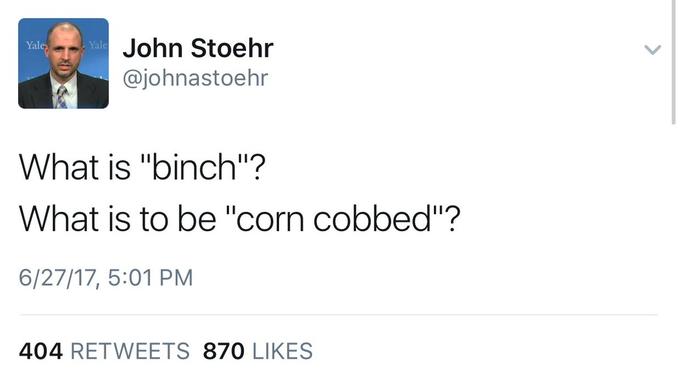
15. “that’s the cost of my vegan lunch” (pg. 18)
In April 2015, a pro-vegan Twitter account called “Vegan Revolution” tweeted a picture of their apparently cheap and awesome vegan lunch:
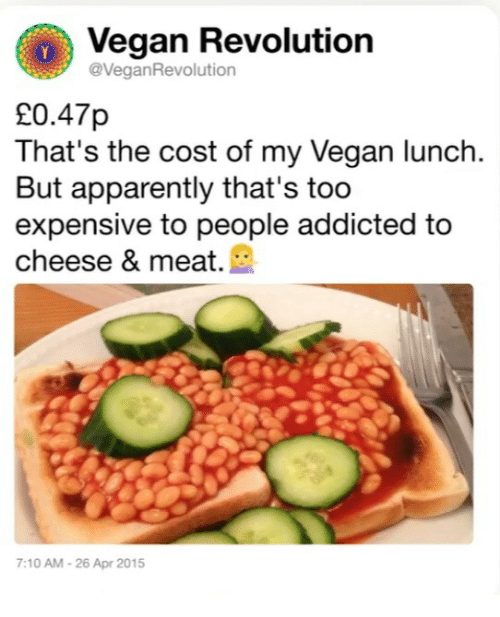
Since the lunch looks . . . pretty bad, the post became a meme, with Twitter users posting pictures of extremely unappetizing or inadequate meals using that same caption:
https://twitter.com/BASEDJESUS/status/730873862636724225
$2.56
That's the cost of my vegan lunch pic.twitter.com/EwCcqBUAre
— OnlyAfro (@OnlyAfroGames) May 15, 2016
16. “pants burn leg wound” (pg. 18)
This is a quote from a 2009 tweet by Iowa senator Chuck Grassley, who tweeted about his experience cutting down trees along the line of the fence surrounding his house and burning them. He wasn’t careful, so his pants caught on fire, and hurt his leg. Luckily, a helpful neighbor was there to pour water on him and quench the fire.
Work on farm Fri. Burning piles of brush WindyFire got out of control. Thank God for good naber He help get undr control PantsBurnLegWound
— Chuck Grassley (@ChuckGrassley) April 11, 2009
17. “In remembrance of those we lost on 9/11 the hotel will provide complimentary coffee and mini muffins from 8:45-9:15 am” (pg. 22)
Marriott Hotels was critiqued in 2013 for this sign:
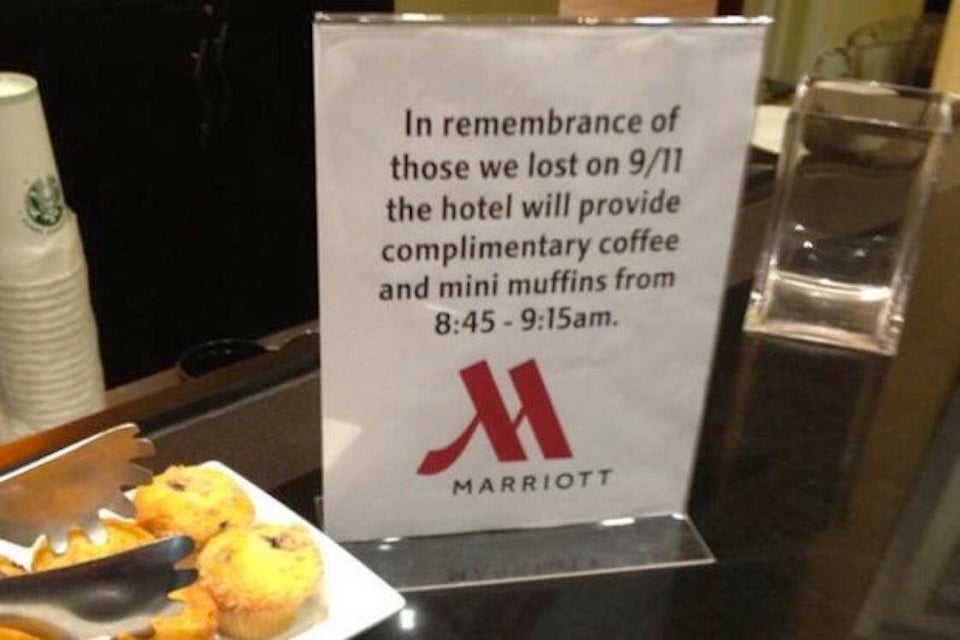
18. “a new species of tree frog . . . scientists speculated that the reason it had never been before seen was because, quote, ‘It is covered with warts and wants to be left alone’ . . . it me” (pg. 27)
This particular frog quote is fictional, though it may have been inspired by the tomato frog, who will “puff up when it is stressed and wants to be left alone.” It’s a fictionalized version of the “it me” meme, where a user replies to a headline or quote (that usually references something non-human) with “it me” to make a joke about their behavior.
Some headlines are now getting retrofitted to the “it me” meme in hopes the attached article will go viral, such as the obnoxious astronomy headline, “Something Big Crashed Into Uranus and Changed It Forever.”
19. “a million jokes about wanting to leave this timeline and slip into another one” (pg. 30)
This refers to the Darkest Timeline, an idea based in the multiverse theory, which basically asserts that infinite universes are occurring simultaneously alongside our own, encompassing all permutations of events. The Darkest Timeline posits that we live in the worst of all possible worlds. The phrase “The Darkest Timeline” was popularized by a 2011 Community episode, “Remedial Chaos Theory,” which showed the different possible timelines when each friend in the central friend group went to pick up a pizza.
When Donald Trump was nominated and then elected president, several articles claimed (facetiously) that this was proof we were living in the Darkest Timeline, and throughout the Trump presidency Twitter users used the Darkest Timeline in reference to concerning political news:
If you would’ve told me five years ago Donald Trump would be POTUS and Kim Kardashian would be in the Oval Office discussing prison reform with him I would have called you insane.
We truly live in the darkest timeline.
— Deniz S. (@MrFilmkritik) May 30, 2018
I cannot believe I am listening to the president’s moron son-in-law in the middle of a national emergency. This is the darkest timeline.
— Tom Nichols (@RadioFreeTom) April 2, 2020
But the subjects of the meme aren’t limited to politics:
We live in a world where a Dora the Explorer movie with Michael Bay as its producer is going to be a thing.
This is the darkest timeline.
— Benjamin Breuer (@BenjaMage) October 23, 2017
https://twitter.com/Mr_Goodfellow91/status/1216901224567463937
The implication of all these tweets being that we do not deserve our bad fortune, if not for which we would be living in a gentler world just nearby, where Democrats stand up to Republicans, where Joe Biden did not call his wife his sister and his sister his wife, and a restaurant other than Taco Bell has been voted the best Mexican restaurant of 2018, and Blazing Saddles is not being remade as an animated samurai movie about cats and dogs, and Dr. Phil is not here to rock this bitch.
we are living in the darkest timeline https://t.co/hIB3iVAm6q
— sloane (sîpihkopiyesîs) ? (@cottoncandaddy) September 15, 2018
20. “enormous fatberg made of grease, wet wipes, and condoms is terrorizing London’s sewers” (pg. 31)
What it sounds like. A 210-foot-wide clump of oil, fat, and wet wipes was found blocking a London sewer in 2017.
21. “at least twice a week she was forced to picture that terrible thing, a baby hitler” (pg. 36)
A thought experiment asks, Would you go back in time to kill Baby Hitler, possibly avoiding the Holocaust but Butterfly Effect’ing any number of other crises into existence? In 2015, 42% of New York Times Magazine poll respondents said yes. 28% said Not sure.
Said Ben Shapiro to a confused crowd at the 2019 March for Life: “The truth is no pro-life person would kill Baby Hitler. Baby Hitler was a baby.”
22. “a man who wanted his wife to fart all over him” (pg. 39)
James Joyce.
23. “her generation . . . had spent most of its time online learning to code so that it could add crude butterfly animations to the backgrounds of its weblogs” (pg. 50)
Geocities.
24. “all we were normalizing was the use of the word normalize” (pg. 51)
The word normalize leapt in popularity (and shifted in meaning) during Trump’s rise to power. Writers and politicians warned we must not normalize Trumpian hate, or the Trump presidency, or Trump himself—that is, we shouldn’t make the abnormal normal.
The word is now used commonly on Twitter to essentially mean “Do this thing / this thing should be allowed”:
https://twitter.com/QuavoSenpai/status/1363520742424514562
Normalize ghosting Men with unclear intentions.
— Xole_25?? (@Xole_25) February 19, 2021
https://twitter.com/JAYVERSACE/status/1363662051181166593
And now it’s also a joke format:
https://twitter.com/Annabllebitch/status/1362517793263005696
25. “caucasianblink.gif” (pg. 51)
This.
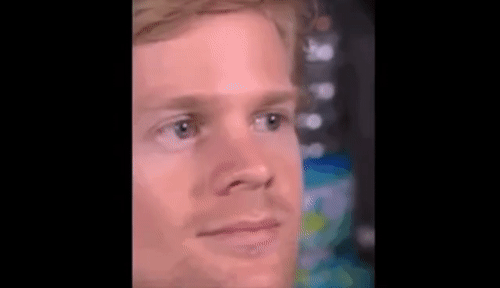
26. “CIA Confirms “Charlie Bit My Finger” Was on One of Osama Bin Laden’s Computers.” (pg. 55)
True: after his death, the CIA released a list of files that were on Osama Bin Laden’s computers, warning that the content was offensive and emotionally disturbing. The list of files included Tom and Jerry cartoons, Wallace and Gromit, Mr. Bean, and a video called “How_to_Crochet_a_Basket.” It also contained “Charlie Bit My Finger,” one of the first viral Youtube videos:
People found this information funny.
27. “sometimes [the pieces of writing] were about going to a deli with a poor friend who was intimidated by the fancy ham” (pg. 56)
In a 2017 New York Times column, David Brooks made the case that social norms segregate different economic classes more than structural barriers. To hammer this point home he told a bizarre story about going to lunch with a less educated friend who could not comprehend the names of the sandwiches:
“Recently I took a friend with only a high school degree to lunch. Insensitively, I led her into a gourmet sandwich shop. Suddenly I saw her face freeze up as she was confronted with sandwiches named “Padrino” and “Pomodoro” and ingredients like soppressata, capicollo and a striata baguette. I quickly asked her if she wanted to go somewhere else and she anxiously nodded yes and we ate Mexican.”
28. “a robot who once said she would like to destroy all humans” (pg. 58)
Sophia the Robot.
29. “the old sense of humor, which had mostly been about the difference between the way black people and white people drove cars” (pg. 62)
This joke from The Simpsons:
30. “I have eaten the blank
That were in the blank
And which you were probably saving for blank” (pg. 62)
For a while, people were using “This Is Just To Say” by William Carlos Williams as a joke template. Fun!
i have drunk
the water
that was on
the moonand which
you were probably
saving
for researchforgive me
it was refreshing
so untouched
and so cold— jonny sun (@jonnysun) October 26, 2020
I have scheduled
the press conference
that was at
the Four Seasons Total Landscapingand which
you were probably
saving
for the Four Seasons HotelForgive me
It is hilarious
so sweet
and so cold— Celeste Ng (@pronounced_ing) November 10, 2020
31. “a war criminal committed suicide by drinking poison in The Hague, and this was somehow the funniest thing we had ever seen in our lives” (pg. 64)
In late 2017, Croatian general Slobodan Praljak, upon being found guilty on appeal for his involvement in war crimes against the Bosnian Muslim population in the 1990s, said he rejected the verdict, pulled out a little bottle of poison which he drank, and pronounced, “I just drank poison.” He died in hospital shortly afterward.
Stills of Praljak’s suicide were then used as reaction images online. The images were often used to connote someone being dramatic, like this post by writer Brandy Jensen:
when I receive even the mildest criticism or face a minor obstacle pic.twitter.com/WzjsBEsvfK
— Brandy Jensen (@BrandyLJensen) November 29, 2017
32. “the portal’s favorite stories, now, were about interracial friends who met playing online Scrabble and eventually invited each other to Thanksgiving dinner” (pg. 67)
A reference to two stories. One: this 2017 story which went viral on Twitter before it was picked up by news outlets; young rapper Spencer Sleyon and 80-something-year-old Rosalind Guttman were randomly paired by the app Words With Friends, played games for over a year, and finally met in person.
so last summer i randomly met this 80 y/o woman on words with friends. we played 300+ games together and she actually ended up becoming a good friend of mine. today i got to go to florida and meet her in person? pic.twitter.com/VXDbNS4eUo
— ☔️half-empty☂️ (@half___empty) December 1, 2017
Two: in 2016 grandmother Wanda Dench sent a text to what she believed to be her grandchild’s number inviting him to Thanksgiving dinner, and accidentally texted 17-year-old Jamal Hinton. When the mistake was revealed, he attended anyway—the start of a tradition and friendship which lasted for years.
https://twitter.com/Jamalhinton12/status/1314361555983593472
33. “everyone was reading the same short story” (pg. 69)
Cat Person.
34. “everyone gathered together to watch the incest commercial” (pg. 69)
The 2009 Folgers commercial “Coming Home,” where a brother comes home from volunteering in “West Africa” and his sister says, “You’re my present this year,” has been canonized for its sexual charge. You can read GQ’s oral history of the commercial here.
35. “‘Mamma mia,’ she said to her sister’s stomach, and offered it a tiny chef’s kiss” (pg. 72)
Online, the al bacio gesture—the Italian “chef’s kiss”—is used as a reaction to Good Content. We presumably got here because the stereotype of the Italian chef, always giving said kisses, was popularized in America via post-WWII advertising.
Taylor Swift’s mind *chef’s kiss*
— FLETCHER (@findingfletcher) July 24, 2020
36. “looking like a very thicc snack” (pg. 79)
Here is the origin of thicc, which means, intuitively, voluptuous and curvy. (Some say its first online recorded usage was on an Angelfire-hosted hip-hop website in 2004.) Here is the origin of looking like a snack, which means, intuitively, looking good enough to eat. (KnowYourMeme says though the phrase had been used sincerely on Black Twitter since the 2000s, it began circulating more widely in absurdist contexts in early 2017.) Some Twitter jokes apply this flattery to surprising subjects, like cartoon characters or a particularly padded couch.
37. “Report: Man’s rectum fell out after he played phone games on the toilet for 30 minutes” (pg. 85)
That’s true. But the guy had suffered from rectal prolapse before.
38. “go too far, and find yourself saying that you didn’t care that a white child had been eaten by an alligator” (pg. 87)
In 2016, a 2-year-old Nebraskan boy was eaten by an alligator at a Walt Disney World hotel while making sandcastles on the beach with other children. Twitter user “Brienne of Snarth” (@femme_esq, now suspended) commented on the tragedy, “I’m so finished with white men’s entitlement lately that I’m really not sad about a 2yo being eaten by a gator bc his daddy ignored signs.”
39. “the detective show that no one could understand” (pg. 89)
Twin Peaks: The Return.
40. “she must accept, for now, that the craze for ass-eating had been organic” (pg. 89)
There is indeed a craze. In 2014, Gawker declared a “booty-eating renaissance” and The Cut claimed “rim jobs [were] on the rise”; The Daily Beast dubbed 2014 “the butthole’s banner year.” Said banner year was capped off by a viral Youtube video by YouTuber Filthy Frank entitled “I EAT ASS (FULL SONG)” that has received over six million views to date.
In 2017, the media started talking about it again, for some reason. Perhaps because of this popular tweet?
it's 2017 grandpa we eat ass now https://t.co/gw0ChFSdsY
— elijah daniel (@elijahdaniel) August 16, 2017
Perhaps because thinkpieces breed thinkpieces? Unclear. Lockwood wonders about the genesis, as do others. Quora user Leeman Chang puts the trend in perspective.
You think I’m scared to eat ass baby I watch people die in my dreams every night
— Thomas (@len0killer) February 14, 2021
41. “Experience: I was swallowed by a hippo” (pg. 98)
Yes. In 2013. In The Guardian.
42. “the shorthand we developed to describe something could slowly, brightly, wiggle into an example of what it described: brain worms” (pg. 105)
Shorthand for stupidity and mental rot. Often used on others: “If you have [political/pop culture opinion I disagree with], you have brain worms.” Or, self-deprecatingly: “My brain worms have unionized.” A popular usage is actress and podcaster Dasha Nekrasova in 2018, insulting an InfoWars reporter by telling her, “You people have like worms in your brain, honestly.”
The term was often used to insult Donald Trump during his presidency.
The Brain Worms Presidency
— Chris Hayes (@chrislhayes) August 30, 2018
https://twitter.com/Muna_Mire/status/1136764305020542976
43. “galaxy brain, until something starry exploded” (pg. 105)
Lighthearted shorthand for being cosmically wise, or playing four-dimensional chess. The term is derived from the final frame of the Expanding Brain meme, which shows a person’s brain size corresponding to the thoughts on the right side of the meme:
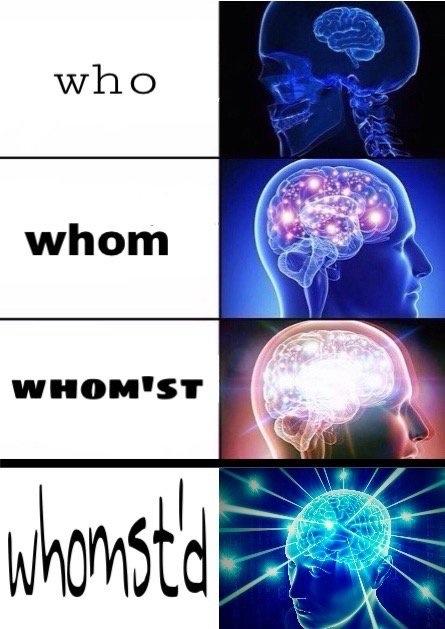
It’s usually used ironically, with the galaxy brain frame corresponding to an overly complicated or bad idea.
The phrase can also be divorced from the image: if someone makes a really bad choice or has a clearly wrong opinion, onlookers might ironically call it “galaxy brain.”
44. “the gorilla who understood she was a person” (pg. 127)
Koko.
45. “Messy bench who loves drama, she thought, the words rising into her head like a warding spell” (pg. 134)
“Messy bench who loves drama” is a quote from the television show The Good Place. In the television show, there is a conceit that none of the characters can swear, because they are ostensibly in heaven, which doesn’t tolerate profanity. Hence, bitch → bench:
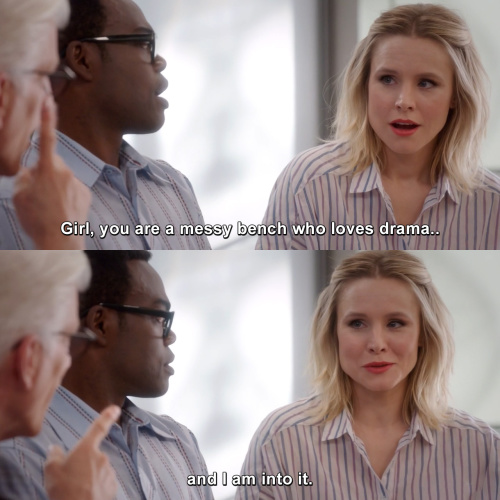
“Messy bitch who loves drama” is a popular canned phrase (also seen as “messy bitch who lives for drama”); the phrase is attributed to comedian Branden Miller, who made a 2015 Instagram video in character as his creation Joanne the Scammer where he said, “Hey girl, I just want to let you know that I’m a real messy bitch, a liar, a scammer. I love robbery and fraud. I’m a messy bitch who lives for drama.”
46. “she would slap the table with all her might and say, ‘Who do you think you’re talking to? I was a mythology girl’” (pg. 135)
The mythology girl sits beside the horse girl in the taxonomy of girls.
https://twitter.com/lilliesuperstar/status/1024117504048807936
47. “dark stock photo of an elderly ob-gyn crouched between a pregnant woman’s legs, eating a large and luxurious sandwich” (pg. 139)
A Dark Stock Photo is a stock photo that depicts something unsettling, raising the question, why did the Stock Photo guys feel the need to create such a Stock Photo?
The image I believe Lockwood to be referencing is below.

48. “In her photoroll, between pictures of the baby learning to smile, was a picture of perfect juggalo makeup imprinted on a woman’s bare ass” (pg. 152)
This NSFW photo taken by Nate Igor Smith.
49. “‘Yes,’ said her sister . . . ‘We can also mourn Harambe’” (pg. 154)
Remember Harambe? A gorilla housed at the Cincinnati Zoo, Harambe was shot and killed by zoo officials on May 28, 2016 after a 3-year-old child fell into his enclosure. Harambe had dragged the child out of the moat into which the child had fallen, prompting the shooting; but viewers were split on whether Harambe posed a danger to the child or was in fact protecting him. The child was not injured.
Candlelight vigils were held at the Cincinnati Zoo and other zoos for Harambe; over eighty petitions seeking “justice for Harambe,” which meant new safety rules for the Cincinnati Zoo, or criminal charges for the zoo employee who shot Harambe and for the child’s parents, or erecting a memorial to Harambe, or shutting down all zoos everywhere, sprung up online. According to Vox, the hashtag #Justice4Harambe trended on Twitter. Then came backlash to the backlash: critics of #Justice4Harambe noted racist undertones in the public’s hunger to punish the zoo-visiting child and mother, who were Black, as well as misallocated priorities in devoting more publicity to Harambe than many human deaths.
Out of this knotty public conversation sprang jokes. Harambe was Photoshopped into elaborate memorial pictures alongside dead celebrities. Twitter users rewrote the lyrics of popular songs to mourn, or simply reference, Harambe. Comedian Brandon Wardell and Twitter user @sexualjumanji coincidentally started the same joke mourning trend, “Dicks Out for Harambe,” which made its way to unfortunate improv scenes around the country. Cincinnati Zoo director Thane Maynard’s Twitter account was hacked in order to tweet Harambe-related one-liners. More alarmingly, some online populations created explicitly racist offshoots of the Harambe meme, such as using images of Harambe to harass comedian and actress Leslie Jones. And publications noted the racial implications of the meme’s more absurdist strains.
As The Atlantic observed, the memeification of Harambe felt particularly random and inscrutable because the story of Harambe had no clear moral lesson or villain to mock. Harambe signified nothing, so memers could co-opt Harambe for their own ends—spoofs of social media slacktivism, or grotesque racist caricature, or just getting in on the trend.
The inciting incident occurred in May 2016, but Harambe had staying power: voters cast write-in ballots for Harambe in the 2016 presidential election, though journalist David Leavitt’s claim that Harambe received over 11,000 votes which if used differently “would have saved our country” was roundly debunked. And in February 2017, a Cheeto said to resemble Harambe sold on Ebay for $99,900. Life! Life! Life! Life!
Here is a poem on the subject by Destiny O. Birdsong.
50. “a photo of a hot actor in a 2014 staging of The Elephant Man, in which he played the main role without prosthetics, just by twisting his torso and making a weird face” (pg. 159)
Bradley Cooper.
51. “‘I saw a meme the other day,’ her hairstylist said . . . It was about how cowlicks are formed’” (pg. 179)
This:
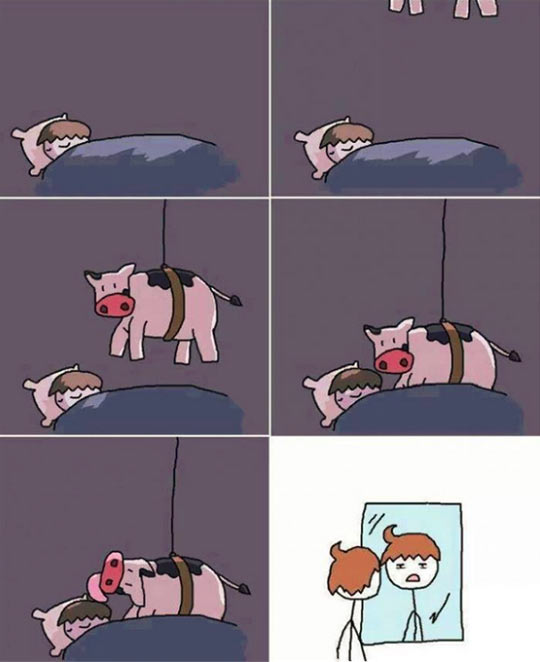
52. “she recalled the text thread she had going with her brother, where he just sent her variations of the ‘guess I’ll die’ meme, which to be honest she had never fully understood” (pg. 179)
The “Guess I’ll Die” meme is a photo where an older man in a red sweater shrugs his shoulders, and says, “Guess I’ll die.” This meme is usually used in reaction to a minor hardship (“Goes ten seconds without any attention: guess I’ll die”), but is also sometimes used to illuminate genuine lack of recourse in the face of a problem (“When you’re too poor to afford affordable healthcare: Guess I’ll die”).
*goes 10 seconds without any attention* pic.twitter.com/KmTCRT0LJy
— The Female Book (@thefemaleboook) October 3, 2016
53. “the [locks of hair] that curled mischievously to either side like that gif of the grinch” (pg. 184)
This:
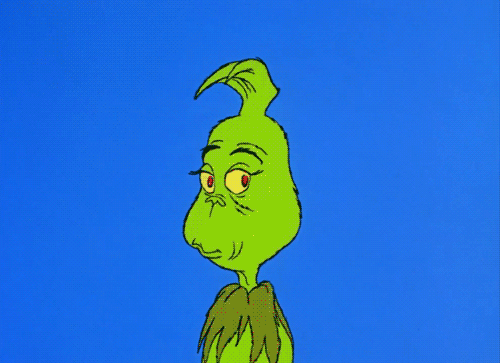
54. “in her photoroll . . . a blonde Fox News anchor with a graphic next to her reading THE HAT THAT DARE NOT SHOW ITS BRIM” (pg. 201)
Laura Ingraham, from this Fox News segment on liberals apparently trying to take away the MAGA hat, which is why it dare not show its brim.
This is the photo the narrator has saved in her camera roll.
good lord this is so preposterous pic.twitter.com/okb1o1RhXv
— Andrew Lawrence (@ndrew_lawrence) January 24, 2019
55. “She said the eels in London are on cocaine” (pg. 203)
Every so often the Internet remembers that cocaine levels entering the river Thames (mostly through Londoners’ urine) are so extreme that it’s affecting the river’s eels. The eels could be getting high, or maybe they’re not getting high. Either way, says an expert, cocaine in the river Thames is “another problem eels don’t need.”
No One Is Talking About This is available now.
Walker Caplan
Walker Caplan is a Staff Writer at Lit Hub and a writer/performer from Seattle.



















